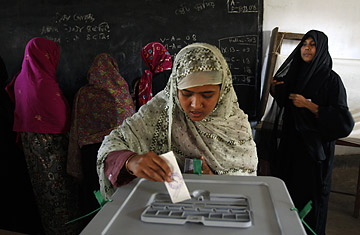
A woman votes during Bangladesh's election in December, 2008.
Freedom In the World 2009 Report
Freedom House
28 Pages
The Gist:
Freedom is on the march! Sort of. According to Freedom House, a nonpartisan democracy and human-rights NGO, freedom has advanced in certain pockets of the globe (shout out to you, South Asia), while having retreated in many other places (but not to you, former Soviet Republics). In this latest version of their annual report, the group surveyed 193 countries and 16 territories, labeling each either "Free" (possessing political competition and respect for civil liberties and an independent media), "Partly Free" (limited political and civil rights, often afflicted by corruption and various forms of strife, or "Not Free" (totalitarian, lacking basic rights or liberties). (See TIME's look at the voting machines of America.)
Highlight Reel:
1. On former Soviet states: "Significantly, the only area to show outright decline during the Bush years was the non-Baltic former Soviet Union, potent evidence of a steadily growing 'freedom divide' between those former communist countries that have joined, or sought to join, the European Union, and those which have yet to cast off the Soviet Legacy."
2. On the "worst of the worst": "Among the eight worst-rated countries, one, North Korea, is a one-party Marxist-Leninist regime. Two, Turkmenistan and Uzbekistan, are Central Asian countries ruled by dictators with roots in the Soviet period. Libya is an Arab country under the sway of a secular dictatorship, while Sudan is under a leadership that has elements both of radical Islamism and of a typical military junta. The remaining worst-rated states are Burma, a tightly-controlled military dicatorship; Equatorial Guinea, a highly repressive regime with one of the worst human rights records in Africa; and Somalia, a failed state."
3. On the region with the most significant gains for democracy: "Despite generalized political strife and continued terrorism in its tribal areas, Pakistan advanced from Not Free to Partly Free status due to the end of military rule and the election of a parliament and president in balloting that was widely considered free and competitive. Bangladesh, which had also been under military rule, experienced an improvement in its political right rating due to successful balloting conducted under reformed electoral laws...Malaysia showed notable progress thanks to expanded opportunities for the political opposition, fewer restrictions on public protest, and greater pluralism in the media."
The Lowdown:
There are two groups of people who should read this fairly brief report — students in a current-events class, and everyone else. While fairly shallow in terms of details (it describes how a series of arrests in Jordan "brought citizens rights to speak freely into question" but neglects to mention what the arrests were about), the overall sketch of events across the world comprises a sort of "freedom 2008 yearbook." Did you know Bhutan had "largely successful national elections" in 2008? Did you know that "The Comoros' political rights rating improved from 4 to 3 due to the restoration of legitimate government to Anjouan, one of the country's constituent islands?" Do you know where Comoros is? Well, read the report, then. Freedom House offers a quick and informative look at the world without much editorializing or preaching.The Verdict: Read
